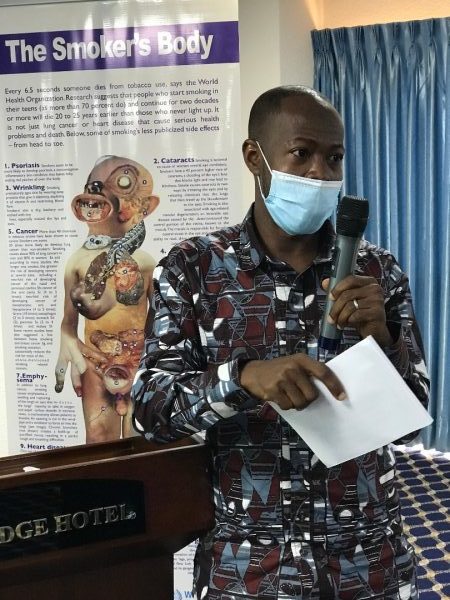
Benefits of Tobacco Taxation Reforms to National Development
Besides the negative public health and human capital impacts, the hiking dangers of tobacco-related diseases also place a heavy cost on public health spending as well as household budgets and the national economy. The total socio-economic cost of tobacco-related diseases includes but is not limited to healthcare costs, work absenteeism, obstruction from the performance of critical social roles like parenting, and other individual or family responsibilities.
Targeting a 30% prevalence reduction through tobacco tax increases, the World Health Organization (WHO) posits that one of the most effective and the least expensive tools in the fight against tobacco use are the application of tobacco tax.
Further, according to WHO, making cigarettes four times more costly in all countries globally by 2015 would reduce the world’s tobacco use prevalence from the current 21% to 15% in 2025. The World Bank connotes under their Global Tobacco Control Program that; Higher taxes on tobacco products reduce tobacco consumption and improve public health, while also increasing government revenues that can be used to fund priority investments and programs that benefit the entire population.
Because there is no maximum tax level, countries that set ambitious goals counting on the effectiveness and benefits associated with tobacco taxation have successfully reduced smoking rates and reaped significant and immediate health and revenue benefits. According to researchers, a 10% increase in the prices of a cigarette reduces significantly the use of cigarettes between 2% and 8%.
Higher tobacco prices are especially very effective in reducing tobacco use in more vulnerable populations, such as youth and lower-income people because they are very sensitive to price increases; this is a call to Ghana directly.
Sardonically, poorer parts of the world still lag in implementing high tobacco taxes that will result in the related high price of tobacco products and Ghana is a culprit. According to the WHO, globally we are yet to realize significant opportunities for improving health from tobacco taxation.
Unfortunately pages 120 and 121 that captured the Revenue Mobilization and Management Programme (RMMP) in the 2022 budget document did not record proposed tax regime remodeling/review aimed at increasing taxes on tobacco products to ensure a relative increase in prices of tobacco products and decrease tobacco use in Ghana.
Further, the Vision for Alternative Development (VALD), Ghana Tax Advocacy Network for Health Promotion and her international partners including the Tax Justice Network Africa (TJNA) will engage with the Ministry of Finance and the Ghana Revenue Authority to explore possibilities of a successful adoption of proposed tax remodeling for the tobacco tax system in Ghana.
Counting on the fact that there is no limit to taxing tobacco and deadlines for increasing tobacco tax in Ghana, we are hopeful that government will respond positively to our call to take this bold decision that will rake in the benefits of reducing consumption, improving citizens health, protect the vulnerable youth and poor people from use/abuse of tobacco and other tobacco products, generate revenue to supplement health budgets, effectively regulate tobacco trade and consumption locally while also improving the international rating of Ghana in contributing to the global WHO goal of a 30% prevalence reduction in tobacco consumption.
The VALD and partners are hopeful this evidence-backed and rights-based call, benched on further dialogic discussion platforms will convince the MOF to consider shifting from the current ad-valorem to adopting a specific tax or a hybrid model for tobacco taxation in Ghana, which will increase the tax rates and relatively increase the prices of tobacco products and cause a reduction in consumption and health risks. This will also significantly increase tax revenue to manage existing and projected tobacco-related disease and non-communicable disease cases and provide adequate resources for regulating the tobacco industry in Ghana.
Rwanda currently implements a mixed tax system. Between 2001 and 2015 (June), Rwanda taxed tobacco products using ad valorem system. In July 2015, the Government of Rwanda added a specific excise tax to the existing ad valorem system. This created a mixed tax system for tobacco products. The new tax policy resulted in reduced consumption of tobacco products.
Gambia also implements a specific tax that is slightly higher than the new 50% minimum prescribed by an Economic Community of West Africa States (ECOWAS) directive. Specific tax overcomes the weakness of the Ad valorem excise tax because it does not depend on import or ex-factory values which comprise only a small part of retail price in ECOWAS countries. With ad valorem tobacco excises, it increases opportunities for tax avoidance and evasion and also creates a situation of dependence on industry pricing decisions.
Recent engagements with the Ministry of Finance (MOF), Ministry of Health (MOH), and their agencies gives us hope of achieving positive health management results and an enviable recognition for the health care sector of Ghana on the global stage, especially in the area of tobacco control.
References:
(i) www.tobaccoatlas.org (ii) www.info@mofep.gov.gh (iii) www.worldbank.org (iV) www.valdghana.org
(v) www.tobaccocontrol.bmj.com

